
On this cool, sunny January morning at Inspiralta, Katty, the Mexican cleaning lady is scrubbing the apartment clean as if her life depended on it. In fact, it’s mine that does, and I am grateful to her every day.
Katty must be in her 40s or so, slim, wiry and strong, with a face that’s survived much sunshine and hard work. Her eyes, berry-black like Mrs Tiggywinkle’s, betray amusement when she sees me emerge from my bedroom for breakfast, my mouth and nose covered by a blue surgical mask, like a refugee from the bubonic plague.
My nurse Joy tells me I must wear the mask even indoors if the outside world has come in, just in case Katty bears more than her infectious smile when she arrives early each day.
I eat my porridge dutifully, with little real appetite, as Katty cleans my room. Thanks to her, I have the luxury (but this week apparently a medical necessity) of fresh sheets every day.
Today’s sheets are cheerful; bright purple flowers strewn around a white polyester expanse. They don’t quite match the roaring tiger-head synthetic blanket that is rolled as a bedspread on top, and crackles with static electricity rather than roars when I lie down.
But the tiger and I have made our peace, and I’m rather fond of him now. Though from his slightly musky smell, I’m not sure he washes every day. I must ask. Big cats may be averse to water, and in this one’s case, the acrylic sheep-wool facsimile on his other side might take at least a year or so to dry.
Katty leaves. Then Joy goes out to do nurs-y things at the supermarket and stock up on food suitable for an invalid with a compromised immune system, wearing her blue mask to protect her from any germs, and by implication me.
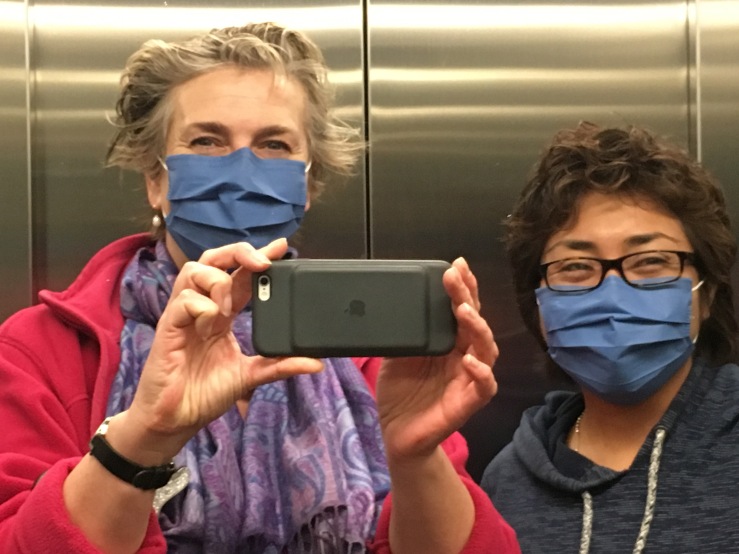
And suddenly, apart from the banshee wailing of the wind on the north side of this ten- storey tower block, the flat is empty and still, apart from me. I’m not allowed out at all as my white blood cell count plummets.
So I am confined to barracks today, or rather the 100 square metres or so (far bigger and more luxuriously appointed than my own draughty flat at home) of my apartment at Inspiralta for the forseeable, or until those new student stem cells hurry up and get to work.
Although I’d admit this to only a few, this languorous state of invalidity is not entirely unwelcome. There is nothing I can do about it, and I need do nothing at all. Perhaps for the first time in around 49 and three-quarter years. There is nowhere I need to be, and nothing I have to do, and nowhere that I am even allowed to go.
Forbidden to do the washing up. Or the Washing. Ironing. Cooking. Working. Walking. Tidying. Breathing in dust, pollen or soil. Eating out. Or anything useful at all.
But nobody has forbidden reading or writing. And lounging aimlessly is expressly bidden.
So I am lying, lolling languidly on the sofa on doctor’s orders. I re-discover to my surprise that it is something I can do extraordinarily well if I only try. Thank you doctor, and thank you nurse Joy.
I can finish ‘Old Filth’ by Jane Gardam in peace after Katty and Joy have left, because there is absolutely nothing else that I must do today apart from encourage my stem cells to grow.
As the stemmies are now (most likely) adolescent, I have happily thrown my usual sensible diet to the winds (some days quite literally), and have spent the day feeding the juvenile stem cells freshly-popped popcorn (good for the digestion, I’m told, and I like it too) and the very smallest glass bottle of full fat Coke as a treat. I am told it settles the stomach, and the stemmies may well like it too.
Today, I can allow myself, my oh-so-very-busy self in my real life (or at least what I still think of as my real life, though perhaps it is not any more, and will never be again), to relax into this lassitude.
The to do lists that scheduled everything to the minute, even sometimes the time we could have while filming and editing and broadcasting for a sandwich or a loo break, the interviews, research, household chores, travel, mortgage, taxes. All irrelevant now. Not necessary. Real life is on hold. I really am an invalid, and I’m allowed to relax.
And once I do cast all those cares away, this becomes a delicious day. Instead of thinking of all the things I can’t do (the sun is out – yes, I do want to come round and play – but sorry, mum – I mean Joy – says I can’t), I persuade myself of all the many benefits of staying in at my Puebla high-rise home.
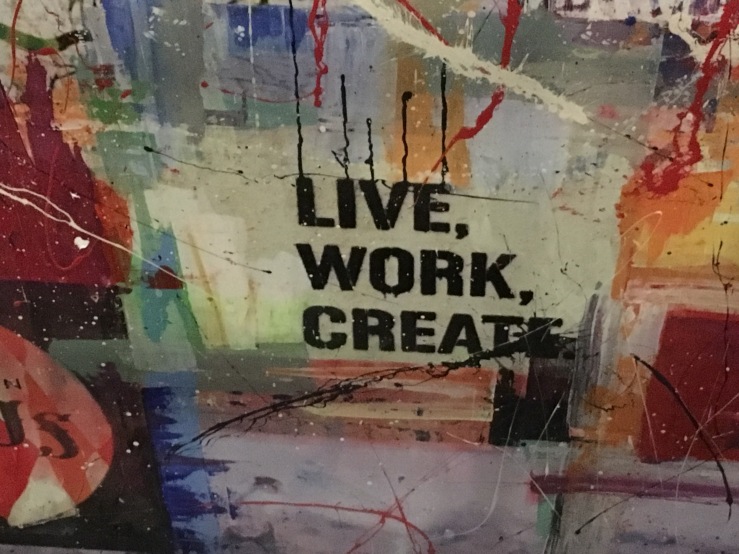
A room of one’s own and perfect peace. Just as Virginia Woolf said – all a woman needs to sit and write. Along with money. Well, I have numbers one and two. Number three we can work on when I am well again.
As I lie on the brown corduroy sofa here, I think of Elizabeth Barratt Browning and her spaniel-eared Victorian curls, lying on her sofa penning love sonnets and “Aurora Leigh”, suffering a lung illness and a spinal injury, before she defies both her father and ill-health to run away to Italy with her romantic husband and fellow poet Robert Browning.
She is far from the only female literary invalid and heroine. So many books written already on “the female malady”, or “illness as metaphor”, woman enduring, battling, beating and sometimes succumbing all too young to physical ill-health, madness or death. All women who ended up, one way or another, in the twilight or the quiet curtained room of the Kingdom of the Sick. How much of that came from the tension between society’s expectations and their own desires? Or pure bad luck, and circumstance?
I give up pondering and return to my book, munching absent-mindedly on popcorn. A friend helpfully texts to point out to me that my stated desire while working as a geriatric nurse (in yesterday’s blog) in Germany to write and illustrate a medical guide-book to poo was already out of date, as the Bristol stool scale has existed since at least 1997.
But I thought of it first! Damn it, my downright laziness and lack of get-up-and-go a whole decade earlier meant that the world was deprived of my full-colour illustrated guide to 100 different types of poo. Instead, it got what I can only describe as a half-arsed scale, based on an extremely primitive faecal measure of a mere one to seven, when all of us (especially with MS, the elderly or after chemo and a stem cell transplant) know there really are far more.
All this would have been a very public service by me, to help the British discuss their bowel movements with doctors and nurses in the same free and easy way that the crappers of Germany, Austria, France, Italy and Spain have long enjoyed as their European birthright, like the Enlightenment. Perhaps the Brexiteers are right. We British really don’t belong in Europe, a conglomeration of countries that boast stool-viewing ledges in their loos. Maybe this is what Theresa May really means by a clean break.
After another sunny hour or two, I lay down the appropriately-named ‘Old Filth’ with satisfaction as Jane Gardam’s beautifully understated finale pulls together all the strands. It’s very good on memory, identity and desire, and belonging, and the irritations of encroaching age and infirmity on life.
I sit down at the dining room table and realise that as an invalid, for now at least, I have somehow returned in mind to the sickroom of my childhood.
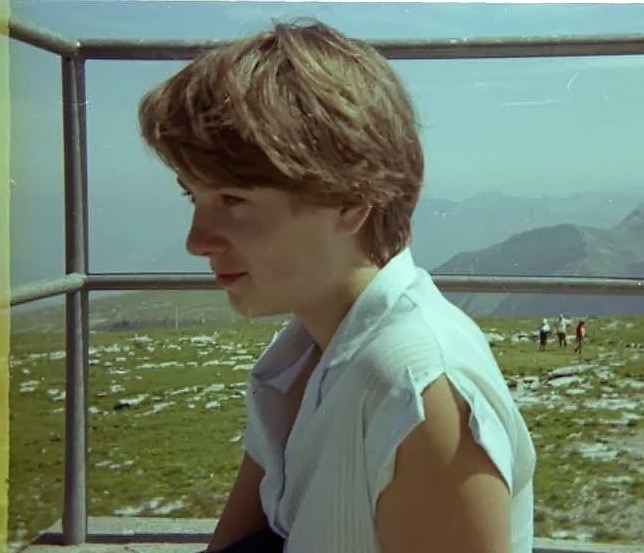
Perhaps that explains why all the references echoing around my brain this week seem to come from my favourite childhood or teenage books. All those decades of hard-fought and hard-won literary sophistication stripped back to the very beginning. Because in the beginning, there was the word.
And those words and those books are all still in there somewhere, trapped forever in my head as a golden seam of memory amid the ever-shifting grainy layers of other knowledge above and below.
The silence and the sofa and the gentle whirr of the fan beside me here in Mexico have somehow combined to set my brainwaves vibrating at just that frequency again, the exact same one as when I was seven or eight or nine, just beginning to realise the utter and infinite wonder of a whole world of books.
From the Egyptian legends to the Roman and Greek myths. Aesop’s fables. Anne of Green Gables. Children on the Oregon Trail. Anything by Ursula le Guin. Any Enid Blyton adventure or the Chalet School Girls. The Wind in the Willows. Watership Down. I read voraciously, indiscriminately and with utter, greedy delight. I would rather spend my pocket money on books than sweets, even the yellowy flying saucers that in a satisfying confectionary transubstantiation let sherbet fizz and melt on your tongue when wet. Or the chocolate and caramel curly-wurlys that went on never quite long enough, just enough to make you want another.
I was also addicted to comics, and my weekly pocket money went on as many comics as I could afford, as the school library provided for the more improving sort of books. I liked the Beano and Dennis the Menace and the Bash Street Kids, but Bella Barlow the talented tough English gymnast in the weekly comic Tammy was my greatest heroine of all.
This must have been around 1974, the time that Olga Korbut and Nadia Comaneci were making news at the Olympics with their grace and athletic bravery, my generation’s own two Simone Biles. That they were Soviet or eastern European didn’t matter: their guts and grace did. Olga was the “sparrow from Minsk” in Belorus.
Bella Barlow, her comic-book counterpart, was an orphan whose acrobatic talents were modelled on theirs. But the difference was that instead of pots of Soviet money, national encouragement and endless coaching, she was English, working class and poor, and living with her evil, feckless aunt and uncle. They are, in true Harry Potter style, horrid to her. Utter total villains.
They squander their money on bingo and booze, and Bella is forced to cook for them, and clean. She is starved of education, does all the housework and is even beaten up by her appalling relatives, though she never shops them to social services, for fear of worse. Bella’s aunt and uncle are far, far worse than Petunia and Vernon Dursley ever were to Harry, though I can’t remember their names. But being the determined heroine that she was, Bella always found solace in the one thing she loved: gymnastics.
With sheer determination, will power, kindness and a quiet stubbornness that finally wears down all obstacles and opposition, Bella the gymnast wins through. And somehow, at last, her ill-willed aunt and uncle see they can make money from her talent – and they let Bella compete, though not without many slips along the way.
And in an enormous stroke of pluck and luck (at last, for I could hardly bear any more hardship and tragedy week upon week after the first year or so) Bella saves a man’s life. He happens to be the Soviet ambassador (Tammy was nothing if not educational), so Bella was rewarded with a gymnastics scholarship to Russia.
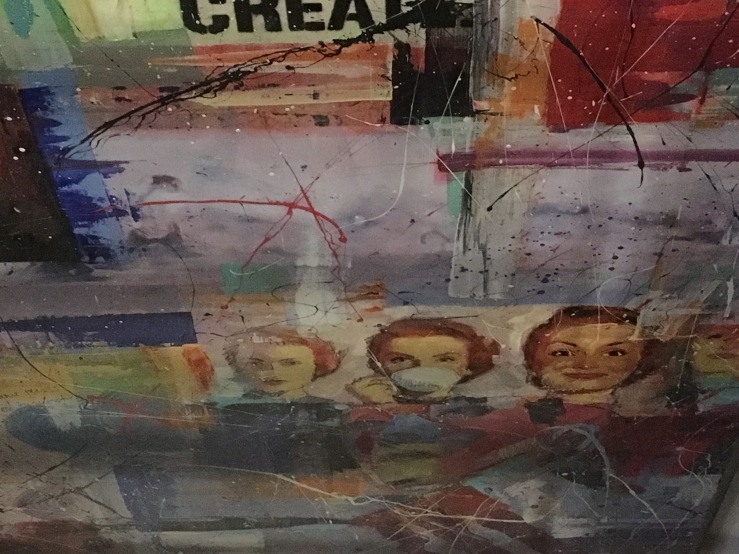
Perfect. But oh woe. I thought Bella would end up living happily ever after and winning the 1976 Olympics. And maybe meeting Piotr the Soviet gymnast love of her life, and fomenting world peace between the Soviet Bloc and the west when they married and had Soviet-British babies, and helped solve this horrid Cold War that people spoke of that had something to do with the Olympics on TV.
But no. No sooner does this miracle happen, than Bella must suffer again. She makes a mortal enemy of a Moscow rival gymnast, and finally, in a terrible denoument, in which she seeks to help her enemy, Bella breaks her back and ends up in a wheelchair.
I have to tell you now – just in case you’re worried – that Bella did eventually rise again to practise on her beloved balance beam and bar, and revert to fantastic medal-wining form, long before Team GB was a twinkle in any Olympic marketeer’s eye.
But not of course until a terrible and lengthy battle back to health, with many setbacks in between, Bella dressed every week in her unchanging overalls and simple black t-shirt, a minimalist well before her time, though I suspect they were meant to denote her poverty and utter lack of clothes (or vanity).
Bella was my heroine because despite all the above, she was never embittered. She remained determined. She would push on against all odds. And just as importantly, she was never perfect, or goody-goody, unlike other irritating heroines in children’s books.
Bella had her faults. She sometimes lost faith in herself. She leapt in without thinking sometimes, quite often with dire results. But always with the best of motives. And there was always the perfect arabesque to be aimed for, or the spectacular impossible leap from the gymnast’s bar in the graceful illustrations on the flimsy cheap paper for the cost of a few pence. I don’t remember how many pence Tammy cost, but Bella was worth every single one. All I can remember is that a Mars Bar then cost 6p and I still had pocket money left on a Saturday to buy at least two comics a week, much to Mum’s dismay.

Yet I never kept a single one. We moved, and we moved house again. So there are no Tammys or Tammy & Junes to remind me of the brilliant drawings and stories that I can still see so clearly in my ageing, blurring mind’s eye. Though luckily my mind’s eye doesn’t suffer from the same blurring that my real left one does. It’s as clear as a Swiss mountain brook, and rather quieter.
I use that still unclouded eye to scan across my childhood bookshelf so many decades on – a dark brown wooden triple row of shelves that hasn’t existed for me in reality since my adolescent self decided to cast aside such childish things, a decision my 49 year old self regrets.
On the edge of that bookshelf is a sticker for Pink Floyd’s Dark Side of the Moon that would never quite come off. I was cross when a mischievous brother stuck it on, though now my nostalgic self wishes it all back again. And somehow my mental gaze stops again at What Katy Did and What Katy Did next, and What Katy Did at School.
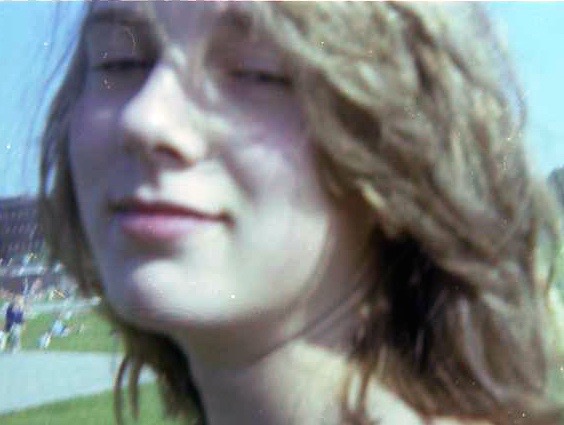
Katy was a heroine with many of the same qualities as Bella, though ending with a rather different moral lesson. As I read the Katy series eagerly in the 1970s, I didn’t realise at the time that these were books written by Susan Coolidge in America in the 1870s, a full century before.
Her heroine – my heroine – is eternal. Katy Carr, a 12-year old American girl growing up in a small town in Ohio. Parents probably middle class. She wears a pinafore on the cover of the copy I had. But inside, Katy is tough. Feisty. A tomboy. A hoyden. Every bit as good as the boys at climbing trees and playing chase. Untidy. Just as my bedroom was when I was seven – never a tidy place unless Mum really, really nagged me. Katy argued with her siblings, just as did I, and later bitterly regretted any harsh words. And just like Katy’s, my clothes were usually stained with dirt after playing in the fields and on the forbidden building site next door with the other girls and boys.
Katy, in other words, seemed to me to be just like me. She always meant to be prettier, cleaner and girlier, but somehow always ended up being tomboyish or just not as nice as she’d meant to.
Until – of course, inevitably – tragedy strikes. A terrible accident (why do or did girls who are tomboys always end up having terrible accidents that cripple them?) that turns Katy into an invalid. But it also metamorphosises her into the good, kind girl she always wanted to be.
Her illness, her broken back, her darkened room, made her a better, more patient girl, who listened more and spoke back less. Who looked out for others, who became the warm and loving heart of the house, even as she was no longer able to walk or run.
I read that sentence now and wonder why these were books that meant so much to me at the time. Although I understand entirely why I am thinking of Katy and Bella now. They got better again, after their dreadful but blessedly temporary dip in fortunes.
But why in the 1970s did both speak equally strongly to me about the unchanging virtues expected of a girl? How being loving, kind and nice (and clean) were more important virtues or skills than anything else (eg prowess at climbing trees, being clever, answering back, physical courage, being wittily horrid to your brothers etc).
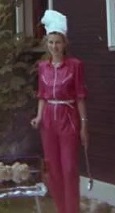
Impossible now to think of a girl today reading novels from 1917, and feeling that same kinship with a childhood a hundred years ago or the aspirations of womanhood being approximately the same.
In my one all short lifespan so far, so much has changed for girls that we take it much for granted that of course women work, and of course they deserve (legally and morally) equal pay. For my mother – who didn’t drive – and for her British contemporaries, who had to leave the service of the foreign office when they married until the 1970s (to ensure that there were enough jobs for the men who needed them more) today would be unrecognisable. The women, like my mum in her 1970s labour-saving kitchen, would still have had to ask a father or a husband to agree to opening a bank account in her name.
This summer, Mum would be 91 if she had lived. And the idea of me, at nearly 50, a spinster, unmarried, child-less or child-free, earning my own living, living on my own, with a room of my own, might perhaps still be to her quite shocking. And some days, to me too. I grew up in her world, and much of that first decade forms me still.
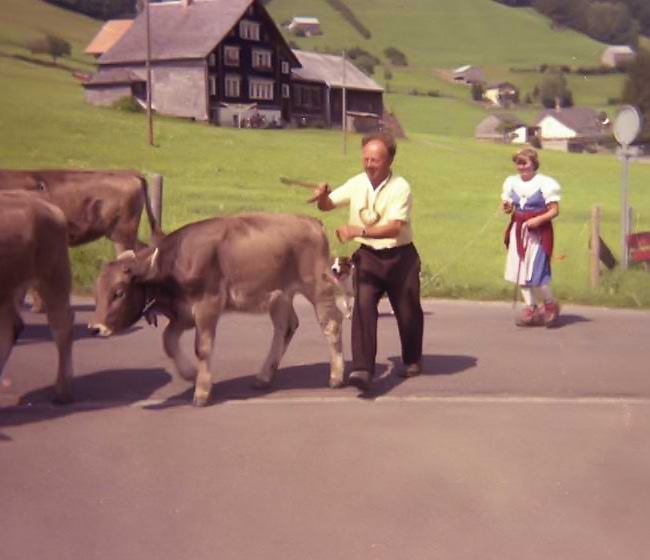
Yet somehow between my early heroines, between Bella, George, Pippi, Nancy, Heidi and Katy, and my brothers and father too, I got the message that it was the striving and going out into the world that also counted for a lot. I’m not sure that in the end I took quite enough notice of the being good and kind bit. And as I grew older, my literary heroines grew up too, to Jo in Little Women and the American girl detective Nancy Drew, though I only found out about her when I went to the American school in Stockholm around the age of 9.
Those earlier years of Bella, though, remain special. Her stories and my precious, ever-expanding bookshelf somehow mingle with the violence of the news on TV during the Troubles, even living in the comfortable peace of Bangor, all so new to my seven year old self that they’re seared, engraved on my memory, perhaps in carbon, the toughest layer of them all.
They still blur together somehow, those years of being seven, eight and nine, into one long adventurous summer. We’d arrived in Northern Ireland in the early 70s. On our first or second night at our hotel, the Europa in Belfast, the most bombed hotel in Europe, there was of course a bomb scare.
My parents were downstairs at dinner, and I was long since in bed asleep, dreaming of the ferry ride we’d had across the waters. Gretli, our Swiss au pair girl, had barely if ever left her gentle valley farm in Unterwasser. She can’t have been older than 18. She had no idea what to do when the siren wailed, but the notices on the wall told us clearly that in the event of a bomb, we were to leave the building. Preferably via the lift, rather than in small bodily pieces hurled out of the shattering glass, though that was never spelled out quite so graphically on the note.

Gretli walked me sleepily in my pyjamas and slippers down the stairs and out of the lobby door, allowing me to bring Muschi too, as my teddy was not to be left on his own.
Outside, it was raining heavily. A car stopped beside us. In the dark, we could just make out three men inside. One leaned out and in the broadest of Belfast accents, tapped his cigarette ash over the side, and asked if we girls wanted a ride, and some shelter from the rain?
My seven year old self had a nagging sense this wasn’t a good idea (don’t talk to strangers, and don’t get in their car, my mother always told me), but Gretli from the Swiss valleys, where no door was ever locked, thought it sounded an eminently sensible idea.
For the next half hour, we stayed blissfully warm and dry in the back of the car as the three middle aged men from Belfast whom we had never met before squeezed up and let us in, (in a country where Gretli barely spoke the language). They drove us around the car park until the all-clear was sounded, courteously drove us back to the entrance, deposited us in the dry, and we were finally reunited with my by now completely frantic parents.
Gretli stayed with us for many years after that, but common sense was not initially her greatest forte. That was her Gugelhopf, Christmas biscuits and Linzertorte, her sewing, her ability to knit dolls’ dresses and her immense sense of fun.
In that long hot and blissful summer of drought in 1976, where the sun never ceased to shine, my best friend and next door neighbour Anne Farlow and I play on our orange space hoppers. Or rather, hers is large and bright – painted with a happy face, as though it’s had a good trip on LSD. Secretly, I’ve always been rather envious of it. But I tell myself that mine is special, too, even if really I prefer hers. Mine is a big red Womble, Orinoco I think, and he bounces high and hard.
The three-foot high red brick walls that surround our new-build houses become our “Bella Barlow the gymnast’s bars” for the season. Anne’s arabesques are more graceful than mine, and she never falls. She is surefooted as a tortoiseshell cat. Her back-bends and cartwheels are things of beauty, like fireworks ricocheting across the lawn, her wiry frame and skinny legs more suited to emulating Bella’s brilliance than my own rather more rotund frame.
I learned more from Anne as I grew up that summer than anyone else. Together, we drew architect’s plans for the buildings that we would create for the cities of the future. On quieter days, we’d draw and scale up the houses and the rooms that we wanted to live in when we grew up and had children of our own.
On sunny days we were gymnasts, or sometimes vandals on space hoppers. Occasionally, we joined the neighbouring children to play IRA and British soldiers. Though I felt I was always unfairly typecast because of my accent.
And it was Anne who patiently explained to me what I’d seen on the news, when I asked her why women with shaven heads were being paraded through the streets, with a voice-over that spoke of tarring and feathering. What on earth was that?
She explained, in words I could understand, that this was a form of punishment carried out by the IRA, mainly against women accused of having relationships with the RUC or even British soldiers. They’d have their heads shaved before being dragged to a lamppost, tied up and hot tar poured on their heads. Then, presumably in an agony of humiliation and pain, they’d have feathers dumped over them that would stick to the tar for several days to remind them and their community of their ‘crime’.
The bombings and shootings on the news were the constant punctuation to our days in the province. Random, sudden death seemed to happen somewhere known or near enough to us so often that we took it quite for granted that of course the soldiers searched you as you went into a shop, and naturally your dad would check under the car for a bomb every day, just in case.
I gathered from the TV and the radio that Stormont was somewhere important. And from my own experience that the big loud man called Ian Paisley, whom I had seen on the telly and bumped into quite literally by the side of one of those strange parades through the streets that involved bands and much shouting, towered scarily over every adult and was perfectly charming when I spilled my fizzy drink over him by mistake.
During the less eventful daytimes, Anne and I – and many other friends – attended Ballyholme Primary School, a wonderful place run by principal Derek Cummings and our form teacher, Avril Kernaghan. How do those names still spring so easily to mind, when so many other later ones have fled?
Their teaching ensured that we left primary school with our love of books intact, an ability to add up and subtract (which sadly atrophied in later years) and a healthy body, after walking to school and back on our own each day, with no need of Gretli or a parent to collect, so paradoxically safe was it in sunny Bangor for a child.
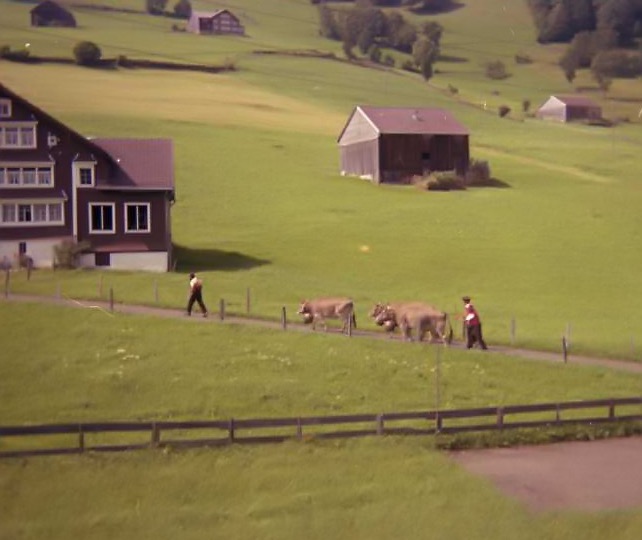
It was those years, it occurs to me with more clarity today, that showed me that a girl could be anything she wanted to be, do anything she set her mind on. Lithe, green-eyed, beautiful Anne continues to be driven, happy and successful to this very day, a polymath whose talents combine work and home and family, while my own monomania enabled me mainly to accommodate work, millions of words, and a copious amount of cigarettes.
The real Anne, along with Anne of Green Gables, Katy Carr and Bella Barlow and many other later friends in real life and in books, form a flow around me, the waters and oceans of friendship that have ebbed and flowed and smoothed the edges of my rough childhood self, polishing and burnishing me until I am like the smallest and smoothest of the seaside pebbles that I collected from the beach near the Inn at Crawfordsburn on one of those gently rainy northern Irish days.

But as the day here turns to dusk, and Popacatapetl dons his majestic evening pomp, I wonder what it was in that childhood that made me want cover wars, to report news, to tell others what it was that people elsewhere did, however awful sometimes, and try to find out and explain why. Why hate can motivate us more than love. How unfairness rankles with the human race. Why difference drives us apart. And why remembering the past can be both good and bad.
Did living through the Troubles – if only for a while – make me want to go out into that big wide world to seek and find out why? And not to be turned back, or kept indoors as the spirit of the house, doing the endless housework and the tough, daily business of loving and caring for the family, as in What Katy Did. Or indeed my mother did.

And how is it, I ponder, that after these last 25 oh-so-busy years out in that world of trouble, chasing after all those stories in so many places that were not my own, I end up here, in the blank white of a quiet room listening to the whirr of the fan, as a semi- (and I hope temporary) invalid?
Is this cool plain room to be the rest of my book or merely a chapter in between? Is this the bit where Bella and Katy are laid low, their bodies but not their spirit broken, before they’re allowed to rise again in triumph?
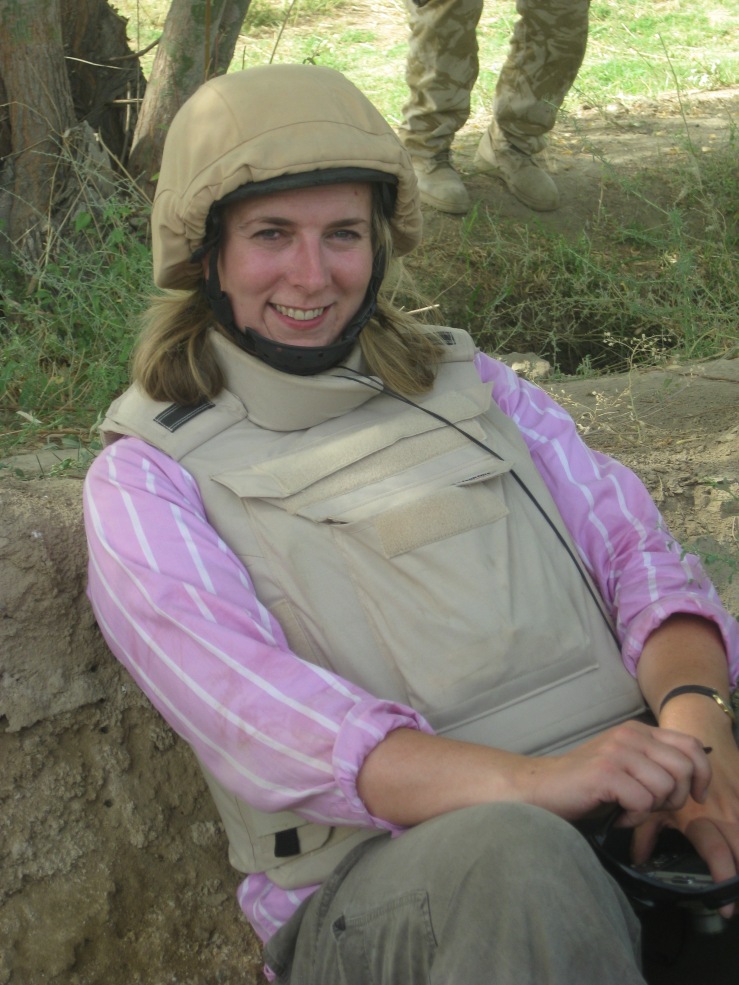
I just don’t know. But we all know that Virginia Woolf was right about the need for a room of one’s own to write. And peace and quiet.
And of course, no mobile phones, no internet, and absolutely no Facebook or Twitter. Though I have the feeling that were they still alive today, the Bloomsbury Set would have taken to Twitter like a dinnerpartyful of Islingtonians today. And Facebook too, or perhaps Two-facedbook.
I moved to Bloomsbury WC1 on the day that Osama Bin Laden blew up the Twin towers: September 11th 2001. We moved ostensibly because my then-boyfriend Peter wished to live near work. But for me, it was almost as much in the hope of chasing after a romantic ideal of all the literature and my favourite books created there.
“A woman must have money and a room of her own if she is to write fiction”. Virginia was right. Even to write fact, or the demi-fiction of memory. All anyone, man or woman, needs to write is a room of one’s own. And no interruptions from the man from Porlock or his modern equivalent, the internet repair man from MexTel who is here knocking at the door to mend my wi-fi.
I must put on my blue face-mask, and let the internet man in, before I return to the sofa to make my peace with neutropenia, as Joy starts to cook supper quietly in the background.
Because of course, that’s the other thing that Virginia didn’t really mention but that any writer really needs: a cleaner called Katty, or a housekeeper, a nurse called Joy, or a wife or perhaps just staff…
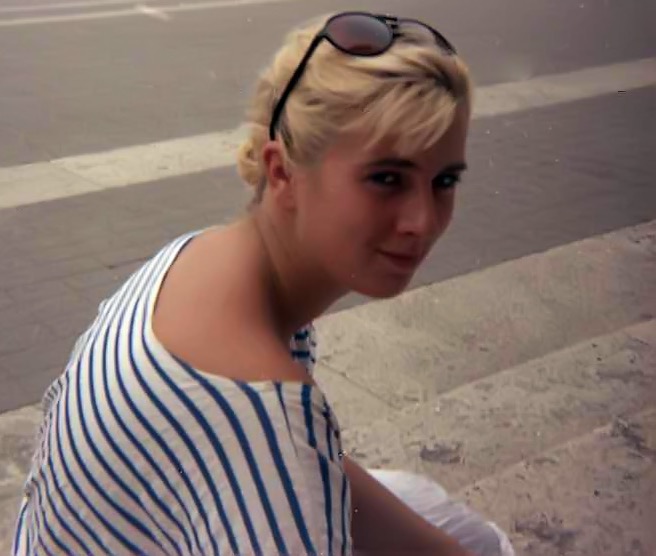
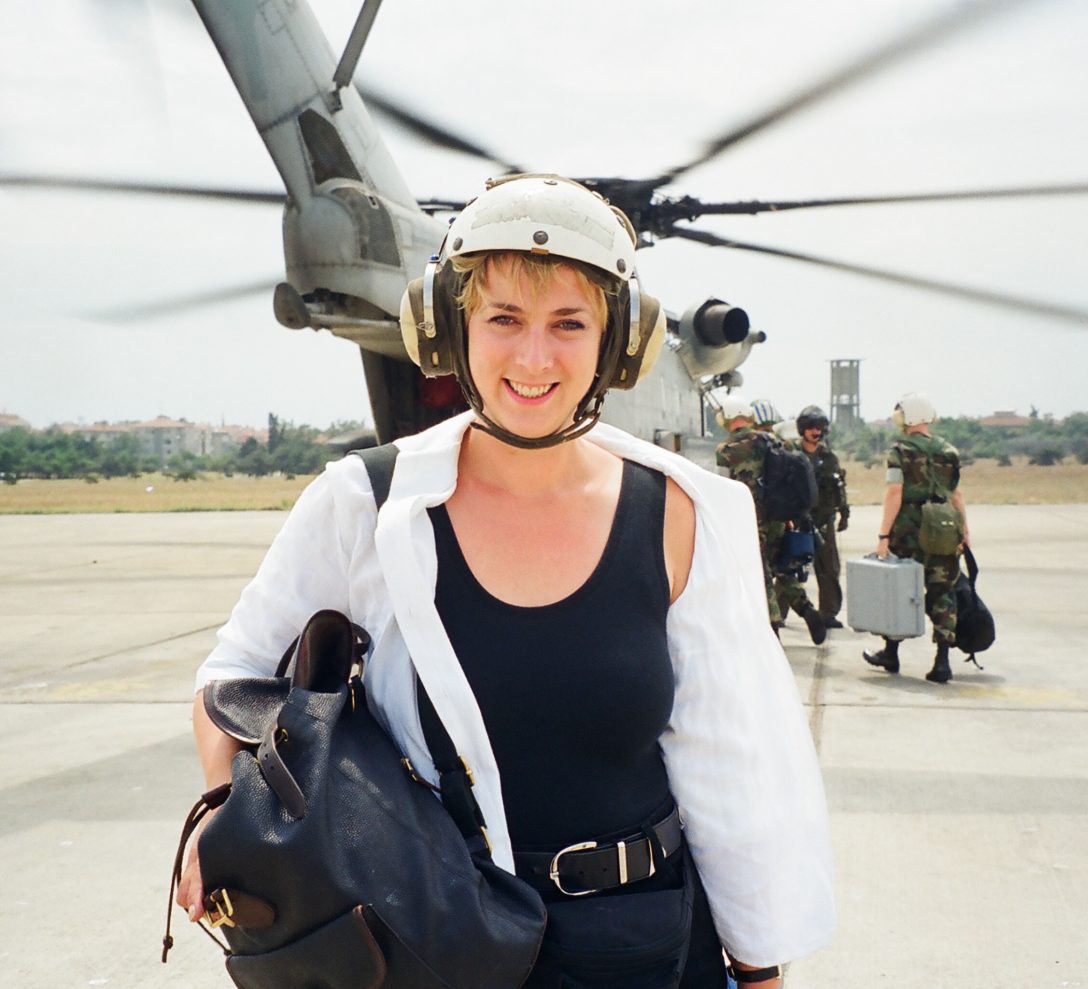
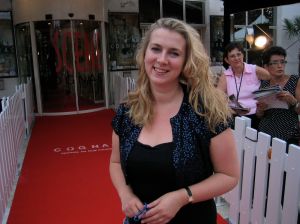
Sitting and reading your latest blog has become my priority every morning, it is so interesting and informative too, clearly the BBC has rubbed off on you. I’m sure that you have a long journey to take but you seem to be in good hands and your indomitable spirit will help you. Good luck Caroline, you remain in my thoughts. Take care.
LikeLiked by 1 person
Well that’s your blog read again, a long one – time for two coffees ,entertaining as ever. Right on with the day.
Mark
LikeLiked by 1 person
The first thing I do in the morning now. Presume/hope this account will be published in book form at some point?
So beautifully written, of course. I confess I skip to the medical bits first and then go back and read the whole thing.
Caroline you are braver than I (at the moment anyway) as I contemplate this treatment for my own MS. Much to consider.
Take good care and please keep us all posted in the future xxx
LikeLike
Gorgeous pics. Can you draw. You know we love your portraits. Hammock waiting on the terrace to continue the farniente when the new you emerges from quarantine. Xx
LikeLiked by 1 person
Another spell-binding piece – and surely you now make up the triumvirate with Bella and Katy, of powerful, determined women who rise through the challenges. Hope your recovery continues well xx
LikeLiked by 1 person
Like everyone else I am hooked on your blog. Enjoying every bit of it 🙂
LikeLiked by 1 person